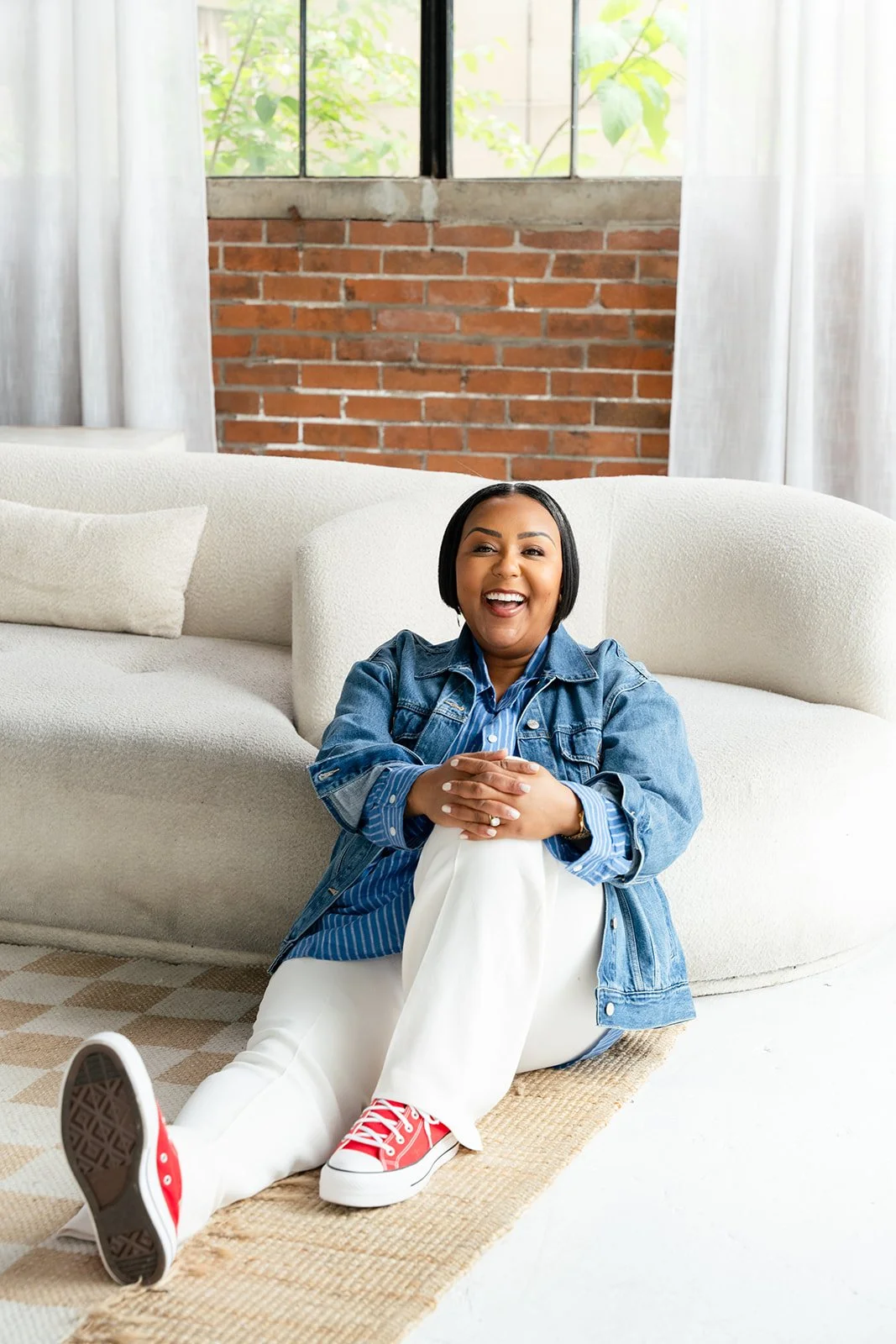Breaking Free from Labels: Achea Redd's Journey to Authentic Self-Worth
The Weight of Others' Expectations
From her earliest memories, Achea Redd lived under the microscope of other people's expectations. As a child, she was constantly aware of her body, with family members and family friends monitoring her eating habits, instructing her on ideal weight, celebrating when she lost pounds, and expressing concern when she gained them. Combined with her natural inclination to please others, this scrutiny created a prison of self-consciousness that would haunt her for decades.
"I needed to be smaller for them," Achea reflects on those formative years. This desperate need to meet others' standards pushed her toward dangerous territory—she began starving herself at just 12 years old, beginning a battle with eating disorders that would continue until she entered recovery at age 38.
But the struggle with body image was just one facet of a larger pattern. Achea was a perfectionist who desperately wanted to please everyone around her. When she inevitably "failed" at achieving impossible standards, she would spiral into deep depression. This became a dark, relentless cycle that defined much of her early life.
A Life That Looked Perfect from the Outside
Growing up as a pastor's daughter in a middle-class, two-parent home, Achea wanted for nothing materially. Private schooling, a suburban home, beautiful clothing—from the outside, she had more than many of her peers. Later, as an adult married to an NBA star and former Olympian, her life appeared even more fairy-tale-like, with access to anything a person could want.
But appearances can be deceiving. Behind the polished exterior, Achea was drowning.
"The reality was that I spent much of my time lying in bed, hiding from the world until it was absolutely necessary to come out of my cave," she explains. "I plastered fake smiles on my face, muttered phony pleasantries, and searched for a way back under the covers."
Throughout her life, Achea found herself defined by labels she hadn't chosen for herself: the pastor's daughter, the head of worship and arts, the NBA wife. These labels felt particularly heavy during her time as an NBA wife, attending Milwaukee Bucks games among an elite group of wives, fiancées, and girlfriends.
"The learning curve was steep, especially as a small-town Midwestern girl," she recalls. "I often felt inadequate, scared and incredibly lonely." Surrounded by women who looked like they'd stepped out of high-end fashion magazines, Achea felt the familiar pressure to prove her worth. She wanted to make her husband Michael proud, wanted his colleagues to see why he'd chosen her, and wanted to demonstrate that she was special and deserving of her place in this world.
When the Body Breaks Down
By 2016, years of anxiety, depression, and trying to maintain a perfect facade had taken their toll. At 38, Achea was clinically depressed, struggling with the same anxieties that had plagued her since childhood but now compounded by adult responsibilities as a mother of two.
The breaking point came on an ordinary morning that would change everything. Achea woke up feeling strange—not nervous about anything specific, but as she brushed her teeth, she could feel her legs and arms shaking. The trembling was internal at first, invisible to others, so she tried to convince herself it was her imagination and continue with her routine.
But it wasn't her imagination, and it didn't go away. The shaking continued for weeks, joined by random muscle twitches that eventually were visible to others. Severe insomnia made everything worse. She lost 10 pounds in a single week as her appetite disappeared entirely.
Then came the morning that shattered her ability to pretend everything was fine. Her eyes snapped open to complete terror as she hyperventilated, her body twitching uncontrollably. Convinced she was dying, she stumbled out of bed, panting and pacing, trying not to wake her husband while wondering if she should call an ambulance.
"Should I call an ambulance? Am I having a heart attack?" The questions raced through her mind as she made her way to the basement to pray. Prayer provided temporary relief, but another panic attack soon followed.
When the panic finally subsided enough for her to function, Achea tried to maintain her normal routine with the children. But she couldn't pull it together—she was crying, shaking, and overwhelmed with nervousness. For the first time, she had to ask for help, calling her mother to come assist with getting the children ready for school.
Her mother found her lying on the couch, hand over her heart, trying desperately to calm herself down. After taking the children to school, her mother insisted Achea see a doctor immediately.
The Diagnosis That Changed Everything
Walking into her doctor's office, Achea felt completely humiliated. She hadn't slept, had been crying, and the woman who always appeared to have everything together was now just a shell of herself. She felt so emotionally drained that she no longer had the energy to maintain her facade.
After listening to her describe her symptoms, the doctor delivered a diagnosis that was both terrifying and relieving: Generalized Anxiety Disorder and depression.
"I was terrified and ashamed," Achea admits. "As a mother of two, I hid my condition from the world, but quickly realized it was only getting worse." Her GAD, combined with her history of depression and past eating disorders, had affected her both mentally and physically, culminating in the nervous breakdown she'd experienced.
In early 2016, with the encouragement of her husband Michael, Achea took one of the most difficult steps of her life: she began therapy.
The Hardest Step Toward Healing
"The day I took the first step into the therapist's office was truly pivotal for me," Achea reflects. For the first time, she began opening up about the traumatic events she'd experienced and the negative thoughts that constantly plagued her mind.
The GAD diagnosis was both overwhelming and oddly comforting. "Suddenly, I had a name and a label for what I had been feeling all these years, but it took a lot longer to understand and accept that I was not at fault for this diagnosis."
Therapy wasn't a quick fix. Over the years, Achea and her therapist adjusted their approaches multiple times as she navigated her healing journey. But gradually, she began to understand something crucial: her mental health struggles didn't define her.
"They are not what I have or who I am," she explains. "They are simply labels that allow me to figure out therapeutic techniques that might help me cope."
Finding Her Voice Through Vulnerability
As part of her healing process, Achea began writing—creating her own blog where she shared her feelings about mental health and authenticity. The response from the community was overwhelming and affirming, showing her that vulnerability could be a source of strength rather than shame.
This positive reception inspired Achea to create something bigger: Real Girls F.A.R.T., a space designed to empower and equip women with the tools they need to use their voices and become their best, most authentic selves.
"I use my own life experience and mental health disorder to help women find their voice and let it out," she explains. "And most importantly, to let women and girls who are suffering, struggling and stressed know that they are not alone."
Building a Toolkit for Emotional Regulation
Through years of therapy and self-discovery, Achea developed practical strategies for managing her mental health. She learned that while others can provide support, ultimately each person needs their own toolkit for emotional regulation.
Her three favorite tools became:
1. Examining Your Inner Narrative: "Sometimes, our emotions are all over the place because of what we think is happening," Achea explains. "We build a narrative that fills in the blanks. Most of the time, this narrative is negative or fear-filled." When thoughts begin spiraling, she recommends taking a deep breath and asking, "What other explanation is possible? What is the truth?"
2. Identifying and Reducing Triggers: Understanding what triggers negative emotions allows you to avoid putting yourself in positions where you'll experience them unnecessarily. Once you've identified your triggers, you can explore why they affect you so deeply and develop strategies to overcome them.
3. Practicing Positive Self-Talk: "So many of us speak negatively about ourselves when our emotions become overwhelming," Achea notes. She advocates for treating yourself with compassion, replacing negative self-talk with positive affirmations. "Be your own biggest cheerleader, and it will shift the negative emotions you are feeling."
Achea emphasizes that emotional regulation isn't just about feeling better in the moment—it's about lessening the extreme peaks and valleys of emotion so you can participate more fully in life and build better relationships.
Breaking Free from Society's Labels
Through her journey, Achea came to a powerful realization about the labels that had constrained her entire life. "Women today are pressured and often forced to define ourselves by what's popular or trendy," she observes. "We are made to focus almost entirely on our outward physical appearance, status, achievements, and accolades to dictate our worth."
These labels, she realized, ultimately box women in and leave little room for growth. They divide rather than unite, enabling endless comparison and preventing authentic self-discovery.
"I've decided that I'm done with the opinions of others, whether in the real world or in the fake world that social media has created," Achea declares. "My beauty is not predicated on the length of my hair or what the scale says. I don't have to be a part of 20 boards and committees to be of value. I no longer have to earn acceptance. I am enough, I am worthy. And so are you."
A Message of Hope and Connection
For anyone struggling with mental health challenges—whether anxiety, depression, eating disorders, or any other condition affecting the brain—Achea has a clear message: "You are not alone. You can find your way back to who you were the day you were born—curious, beautiful, and full of love and life. It just takes one small step."
Her journey from a 12-year-old girl starving herself to please others, to a woman hiding behind fake smiles and perfect appearances, to finally embracing her authentic self, represents the transformative power of seeking help and refusing to be defined by others' expectations.
Achea's story reminds us that healing is possible, that vulnerability can become strength, and that the labels others place on us—or that we place on ourselves—don't have to determine our worth. Sometimes the most powerful thing we can do is take that first small step toward authenticity, toward help, toward believing that we are enough exactly as we are.
Through her blog, her organization Real Girls F.A.R.T., and her willingness to share her story, Achea continues to create spaces where women can discover their voices and recognize their inherent worth—not because of what they achieve or how they look, but simply because of who they are.


